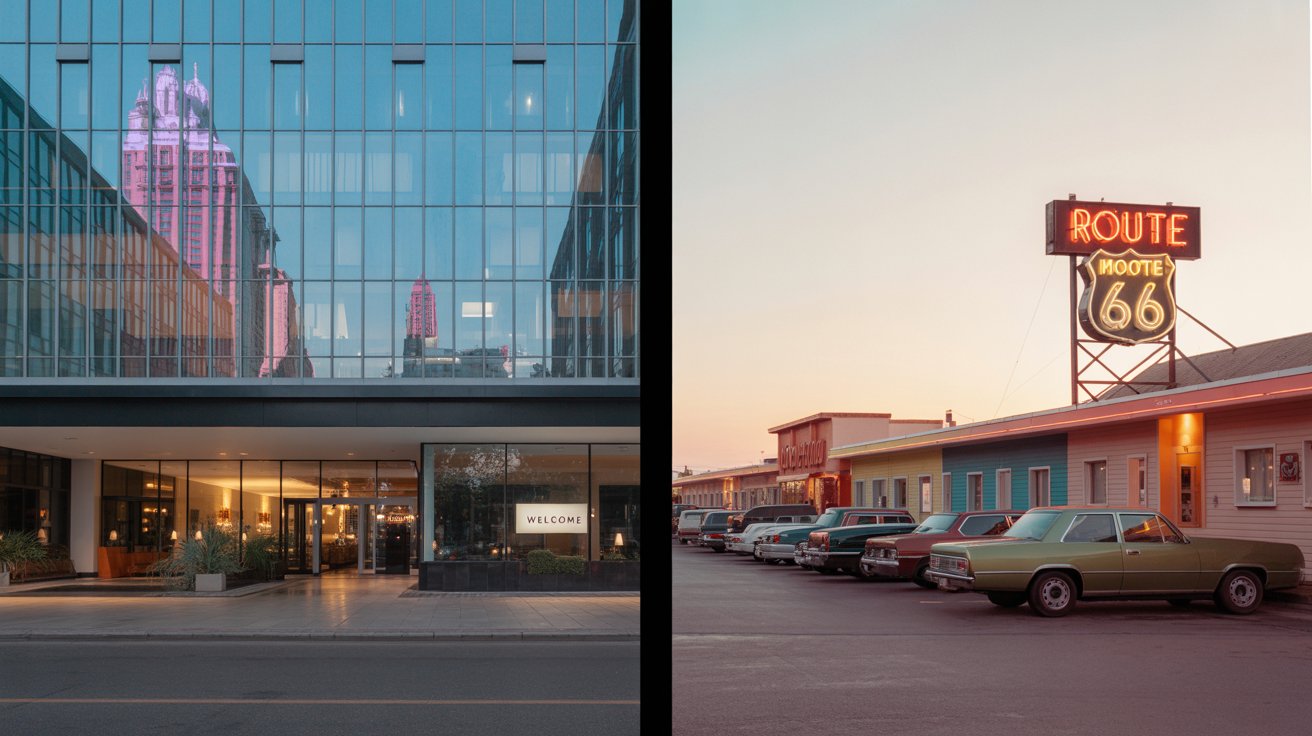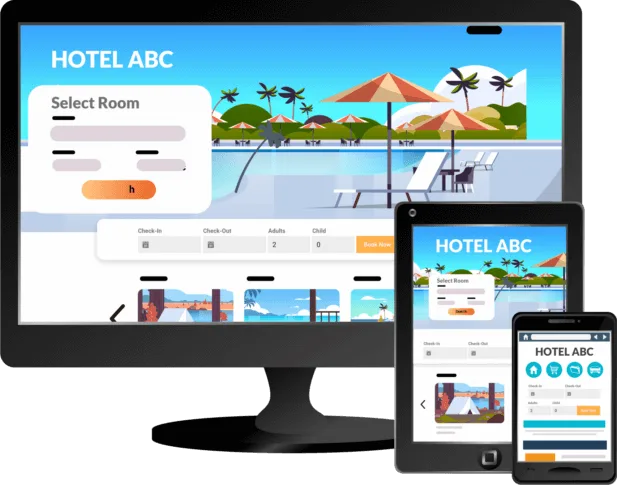What is the Difference Between a Hotel and a Motel? Key Differences Explained

- Aug 29, 2025
In the hospitality industry, people often search for comfortable places to stay while traveling. Two common lodging options are hotels and motels. Though both provide overnight accommodation, they are not the same.
If you are a property owner or planning to invest in travel-related services, understanding the key differences between a hotel and motel can help you in making better decisions and serve your target audience more effectively.
What is a hotel?
A hotel is a commercial establishment that offers a variety of room types starting from budget hotels to luxury hotels and hotel chains to boutique hotels. These are usually located in urban areas or near popular attractions. Hotels cater to business travelers, families and tourists who may need longer stays or are looking for even extended stay options.
A hotel room usually includes room amenities like a bed, TV, desk and private bathroom. Many larger hotels also have conference rooms, business centers, meeting rooms, fitness centers and swimming pools to make the guest experience better and they have better star rating. Some may also offer concierge services, a site restaurant and commercial establishment to guests.
What is a Motel?
The word motel comes from “motor hotel,” meaning it was built for road travelers. Originally it was also called a motorist’s hotel. A motel is usually a roadside accommodation that is often found along major roads, in rural areas or near highways. It is a great option for road trippers and people on short-term stays or road trips. Unlike hotels, motels may not ask for detailed personal information before letting you in.
A motel room usually has fewer amenities in comparison to a hotel. Many motels offer just the basic amenities--like a bed, bathroom and maybe a TV. The buildings are usually smaller and they have fewer rooms and many have exterior entrances which means you can park your car right outside your door. This easy access is quite helpful for people who want to rest quickly during their long-distance drives.
Motel vs Hotel: What are the Key Differences?
It’s time to explore the key differences in the Motel vs Hotel comparison to better understand how they serve different needs in the hotel industry.
-
01
Location and Purpose:
Hotels are found in cities and near tourist attractions or business centers. They are good for longer stays, business trips and vacations.
On the other hand, motels are found in rural locations or along highways. They are built for people taking a road trip or needing a quick stop for the night.
-
02
Size and Layout:
A hotel is usually a larger building with multiple floors, elevators and common areas like lobbies and restaurants. Even the historic buildings are sometimes converted into hotels.
Motels on the other hand are smaller with fewer rooms and often single-story buildings where rooms open directly to the parking lot.
-
03
Amenities and Services:
Hotels offer more amenities and additional services such as swimming pools, fitness centers, conference rooms and concierge services.
Motels have fewer amenities and they usually offer only the basic amenities to meet short-term needs.
-
04
Guest Experience and Length of Stay:
Hotels are designed for comfort and a full guest experience, from relaxing in luxury hotels to exploring boutique hotels in historic buildings. The length of stay can vary.
Motels however are more for short stays and may offer limited service. But they are often seen as a budget-friendly option.
-
05
Target Audience and Price Points:
The target audience for hotels includes business travelers, vacationing families and tourists. Motels on the contrary attract budget-conscious travelers and road trippers. Since motels offer fewer services and their price points are often lower than hotels.
Why It Matters for Property Owners
If you are a hotel or motel owner or someone interested in the hospitality industry it is important to know the distinct differences in the motel vs hotel market as it can guide your business goals.
For example, a motel near a highway can attract travelers by focusing on easy access, quick check-ins and clean motel rooms. Meanwhile, a hotel in a city center can improve the guest experience with more amenities and services, especially for business trips or family vacations.
Understanding what travelers want--be it budget hotels for quick stops or extended stay options in larger hotels--lets you build the right experience and attract more guests.
Hotel vs Motel: Real-World Examples
A well-known example of a famous motel in India is the Highway King on the Delhi-Jaipur Highway (NH-8). Even though it's called Hotel Highway King, it functions more like a motel in practice.
It's popular among road trip travelers for its:
- Easy highway access.
- Ample parking lot.
- Basic yet clean accommodation.
- Attached restaurants and fuel stations.
Such motels cater primarily to transit guests and are designed for short stays.
Next is a well-known example of a hotel in India and it is the Taj Mahal Palace, Mumbai. It is a luxury hotel known for:
- Full-service amenities like swimming pools, fine dining, spas and concierge.
- Catering to business travelers and tourists.
- Located in a city center, not on a highway.
- Offering multi-night stays with premium comfort and services.
Unlike motels, such hotels focus on experience, elegance and extended stays.
Similarly, there are many brands like Holiday Inn that offer both hotel and motel styles depending on the location.
Conclusion
To sum up, the difference between motel and hotel lies in their design, services and the kind of travelers they attract. Knowing these can help you in deciding the right type of lodging to manage or invest in as per your convenient location.
Whether you’re offering limited service or aiming to provide a unique experience with historic buildings and full features, your success completely depends on how well you match your offer with your guest’s travel needs and expectations.


